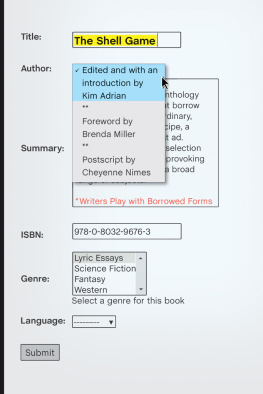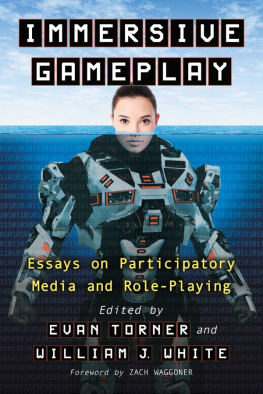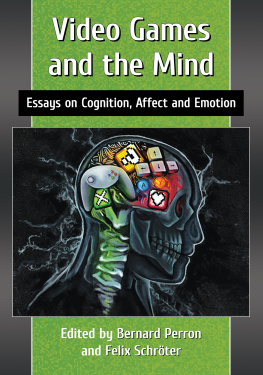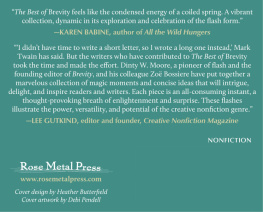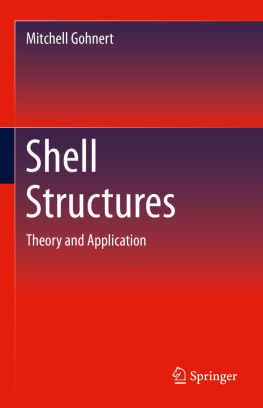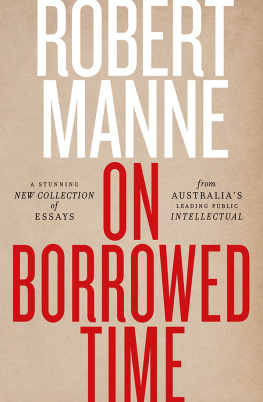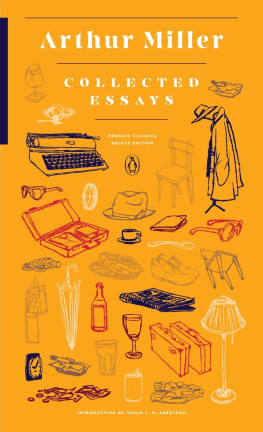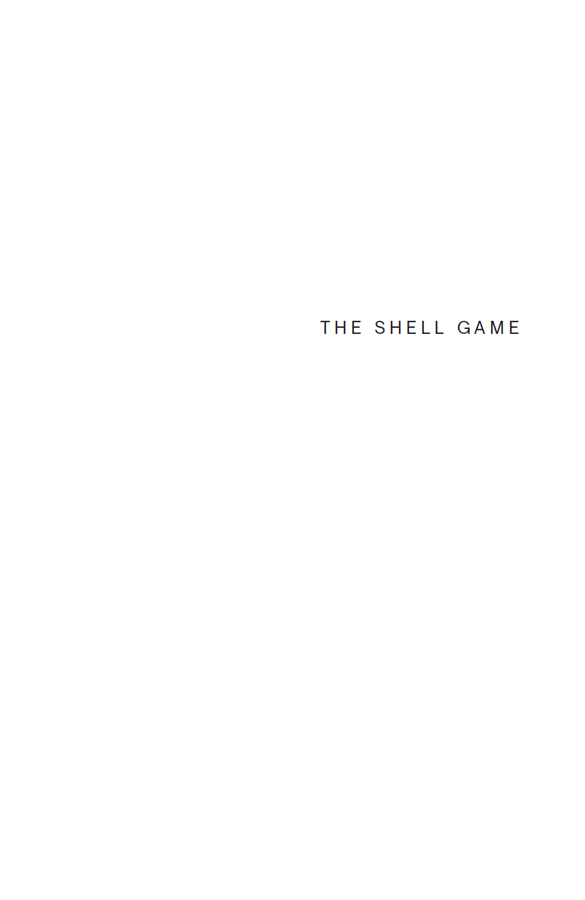

2018 by the Board of Regents of the University of Nebraska
Acknowledgments for the use of copyrighted material appear on pages 24546, which constitute an extension of the copyright page.
ISBN 978-1-4962-0627-5 (electronic: e-pub)
ISBN 978-1-4962-0628-2 (electronic: e-mobi)
All rights reserved
Library of Congress Control Number: 2017043654
The publisher does not have any control over and does not assume any responsibility for author or third-party websites or their content.
Foreword
Discovering the Hermit Crab Essay
BRENDA MILLER
In the summer of 2001, Suzanne Paola and I were hard at work writing Tell It Slant: Writing and Shaping Creative Nonfiction . We divvied up the chapters according to our interests, each of us bringing different perspectives to the many aspects we could cover under the umbrella of creative nonfiction. I wrote most of my chapters at my desk in the two-room house Id rented when I first moved to Bellingham, Washington: a blue shack above the railroad tracks with a view of the industrial shoreline of Bellingham Bay. My cat, Madrona, kept me company, sitting on the wide windowsill and twitching her tail.
It was a beautiful summer, as summers often are in the Pacific Northwest. So as I was wrestling with the chapter called The Lyric Essay, I abandoned my desk and my cat, heading out to my favorite place on the planet: Deception Pass State Park. This park is named for the treacherous currents that eddy and flow under two immensely high bridges spanning Fidalgo and Whidbey Islands. As you cross those bridges, you feel neither here nor there, suspended in air with views of water blaring from every side. You are blessedly out of your element, dangerously soin a state the romantics called sublime .
I had been immersed in a lyric mindset for days, so Deception Pass seemed, itself, to be a lyric essay: a place where beauty juts up against danger, where the contrasting parts come together to make new, unexpected sense. At Deception Pass, you can be surprised at every turn: by a clutch of madrones precipitously leaning out across the water or a mermaid totem that narrates, through images, an ancient Salish legend of transformation. Tide pools appear at low tide, exposing creatures who are usually hidden.
Id been pondering a particular form of lyric essay that borrows other forms to tell its story: essays in the forms of recipes, for example, or field guides, or indexes. But this form demanded something more imagistic, more metaphoric, more, well, lyric to describe it. In these essayswhich Id been writing for a few yearsmy narrative voice had been transformed; I was able to express things Id never been able to do in any other way (or that I didnt even know I wanted to express). Though my narrative self was vulnerable, it also felt powerful, protected. For example, I wrote an essay called How to Meditate that, under cover of the instructional form, was able to distill years of intensive meditative practice into one ten-day writing retreat. Along the way this essay divulged the humor, the pain, and the complexity of this practice for a young woman just finding her way as an adult.
As I crouched down in the tide pools, I saw a whelk shell scuttling about, seemingly on its own. It settled, moved a few inches, and then settled again. I realized I was seeing a hermit crab, a creature who forages for abandoned shells in order to survive. I eventually described them this way in Tell It Slant :
A hermit crab is a strange animal, born without the armor to protect its soft, exposed abdomen. And so it spends its life occupying the empty, often beautiful, shells left by snails or other mollusks. It reanimates these shells, making of them a strange new hybrid creature that has its own particular beauty, its own way of moving through the tide pools and among the rocks. Each one will be slightly different, depending on the type of shell it decides to inhabit.
I continued my walk around the windswept headlands of Deception Pass, noting with enhanced pleasure the view out to the Olympics, layered with islands dotting the horizon. I mused on the chapter Id been writing, and by the time I returned home to my humble shack, I understood that the hermit craba creature who would die without finding its borrowed shellprovided the perfect metaphor for the essays Id been writing and reading: essays that have their own soft, exposed abdomens. The form acts as a cover, a protection, for this material to move into the world.
So I anointed this type of creative nonfiction the hermit crab essay as a way to explain, through metaphor, how a writer can play with form to deal with difficult material that might not be able to live in the world without its own borrowed shell.
Suzanne and I are delighted that, years after the publication of the first edition of Tell It Slant , the term hermit crab essay has become an integral and accepted part of the creative nonfiction lexicon. With every iteration, both the hermit crab creature and the hermit crab essay become more deeply understood, and the possibilities for the form grow by the day. Weve always thought there should be an anthology devoted to these inventive forms, and were so glad that this one, The Shell Game , now exists. This book will be a fascinating read for all those who love writing that propels us beyond the edges of the known world.
Introduction
A Natural History of the North American Hermit Crab Essay
KIM ADRIAN
TAXONOMY
DOMAIN : Anima
KINGDOM : Homo Sentio
PHYLUM : Ars
CLASS : Litterae
ORDER : Exagium
FAMILY : Lyrica
GENUS : Paguridae
COMMON NAME
Hermit crab essay
ALTERNATE NAMES
Borrowed form; appropriated form; received form; hybrid; false document; readymade; curio.
NUMBER OF SPECIES
Theoretically infinite, realistically somewhere in the thousands. Maybe tens of. Some of the more conspicuous include: grocery lists; how-to instructions; job applications; syllabi and other academic outlines; recipes; obituaries; liner notes; contributors notes; chronologies of all orders; abecedarians of all types; hierarchies of every description; want ads; game instructions; mind maps; organizational flow charts; questionnaires; playing cards; tarot cards; horoscopes; tables/charts/spreadsheets; medical advice and warnings; blog entries; Twitter feeds; Facebook posts; email exchanges; police blotters; newsletters; hotel registers; log books; care and use instructions; time cards; catalogue copy; to-do lists; play-by-play commentaries; theatrical programs; maps and their legends; architectural renderings; computer codes; other codes; fill-in-the-blank forms; tests/exams/evaluations; directions (as for travel); directions (as for assembly); paint color fans; Rolodexes; little black books; white pages; yellow pages; illustrated guides; letters of resignation; wedding vows; divorce papers; manifestos; diaries; notes to self; menus; grant applications; award ceremonies; morphologies; ingredient lists; nutritional values; pricing options; photo captions; indexes; tables of content; etymological histories; theoretical abstracts; knitting patterns; sewing patterns; other patterns; packing lists; travel itineraries; and so on; and so forth.
FIELD MARKS
As a rule, hermit crab essays look funny. Not quite right. Theres either too much going on in the visual field (see Caitlin Horrockss The Six Answers on the Back of a Trivia Card) or not nearly enough (see Jenny Boullys The Body [an Excerpt]). Often, the titles are ungainly (e.g., Ander Monsons Outline toward a Theory of the Mine versus the Mind and the Harvard Outline). But such imperfections are part of the charm, since, like its namesake, the hermit crab essay insists on approaching its own existence at a tiltnot quite sideways, but a little bit lopsided and, at the same time, weirdly bullheaded. The shells themselves may (as indicated by the species listed above) take almost any form. Indeed, in terms of shells, there is only one serious requirement worth mentioning: the form should be formal. Established. Recognizable. Traditional. Brave in its mulish adherence to common conventions. Otherwise, whats the point? Only when such a form is in place can the hermit crab essay exert its full magic, tempting ones inner aesthete with its very oddness, forcing upon its readers a private debate: Is this a thing of beauty? An ingenious expression of the human imagination? Or a cop-out? A cheap grotesquerie? Although perhaps the more thoughtful question is rooted in a much simpler requirement: does it work?
Next page
